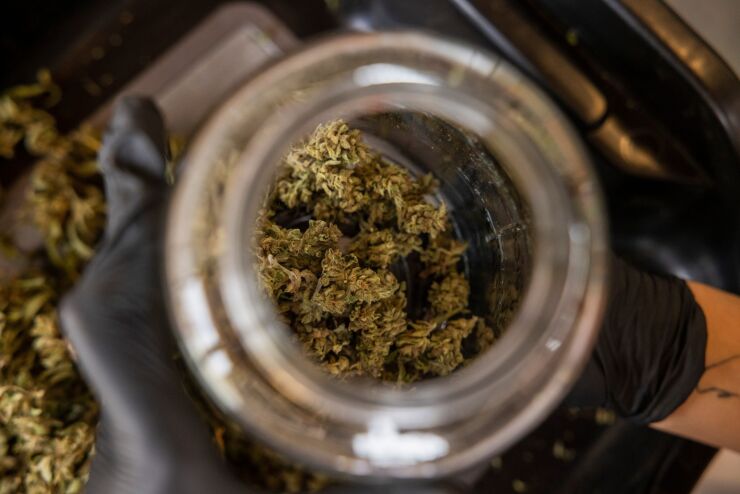
Square's first market for cannabis payments is Canada, but that's unlikely to be where things end — the payments company is laying the foundation for the legalization of marijuana in the U.S. market if the regulatory picture becomes more clear.
Square has partnered with Jane, an ordering platform service for cannabis dispensaries, to support weed dispensaries in Canada. Square has not accepted weed payments in the past, and its move in Canada comes as the U.S. Senate is scheduled to resume deliberations this week on a bill that could fully legalize the substance in the states.
Canada's cannabis regulations aren't necessarily simple, but since marijuana is legal nationally in Canada — in contrast to the U.S., where it is legal only on a state-by-state basis — the regulatory landscape is much clearer. That clarity gives Square a market to build a cannabis payment business that can be transported to the U.S., rather than navigating the much more complex U.S. weed market as its first move.
"What's clever here is if or when the [SAFER] Banking Act does finally pass in the U.S., this will give Square a good level of product infrastructure and market presence to hit the market quickly and potentially expand very rapidly," said Gilles Ubaghs, a strategic advisor for commercial banking and payments at Datos Insights.
Square's Canadian cannabis strategy
In Canada, Jane and Square will support an omnichannel approach that covers online sales, order ahead, pickup and payments at the point of sale.
"The retailers that sell cannabis are not that different than the other retailers that we work with," said Roshan Jhunja, a general manager at Square, noting that health care, restaurants, beauty and other retailers need to sell, track sales and match transactions to inventory so they don't run out of product. "The difference with cannabis retailers is the rigor required to keep up with changing rules."
Square has monitored the cannabis market in Canada since the government decriminalized it in 2018. It began work on supporting payments, but the pandemic pushed back the project.
"It was a challenging time to build a solution. The dispensaries couldn't have people coming into the stores to pay," Jhunja said. "That has settled and it's now the right time for us."
Like oher
"There are some things that are easier in Canada. The ability to pay with a credit card or a debit card being one," said Socrates Rosenfeld, CEO and co-founder of Jane Technologies.
As a large recognizable payments brand, Square's support is a major endorsement, Rosenfeld contends.
"It's a huge step in the right direction for cannabis," he said. "Whenever you can bring a very large global payments tech company into the industry in the spirit of stewardship, it's a milestone and a signal of more things to come."
While the Canadian government has legalized cannabis, there are still different regulations in different parts of the country. Thus, compliance in Canada is still not easy, and partnering with Jane gives Square access to a firm with experience navigating complicated rules.
"There's a complex regulatory setup in Canada," Jhunja said, noting that provinces in Canada have different classifications and regulations.
There are other challenges in Canada for weed sales and payments, Ubaghs said, noting that Canadian provinces don't have clear laws that allow delivery services.
"There are ways around it in some instances, but I think we'd have seen a more substantial 'Uber for weed' type development if it was easier in Canada," Ubaghs said. "Hence e-commerce is important for all merchants, but arguably may be less so for most Canadian dispensaries," Ubaghs said. That issue creates an opportunity for Square to operate in stores.
The U.S. weed market is still uncertain
While Square builds its weed payments business in Canada, the much larger U.S. market awaits. The U.S. Senate has scheduled a markup for the newly renamed
Canada provides a potential test case for mainstream financial services, since
"The key factor here is that cannabis banking in Canada is legal, and while they may not necessarily broadcast it, all the big payment acquirers, gateways and banks work with the industry," Ubaghs said. "There was still some initial reluctance when it was only medical, but that quickly changed with full legalization."
Square was noncommittal about its plans for the U.S. market as the SAFER Banking Act proceeds.
"We're keeping close tabs on the legal and political environment and are focused on helping sellers," Jhunja said.






